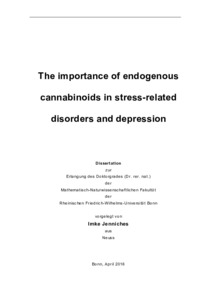The importance of endogenous cannabinoids in stress-related disorders and depression

The importance of endogenous cannabinoids in stress-related disorders and depression

| dc.contributor.advisor | Zimmer, Andreas | |
| dc.contributor.author | Jenniches, Imke | |
| dc.date.accessioned | 2020-04-23T18:57:54Z | |
| dc.date.available | 2020-04-23T18:57:54Z | |
| dc.date.issued | 03.02.2017 | |
| dc.identifier.uri | https://hdl.handle.net/20.500.11811/7111 | |
| dc.description.abstract | The endogenous cannabinoid system (ECS) is a unique neuromodulatory system, essentially involved in a variety of physiological processes. It consists of the two major endogenous cannabinoids (eCBs), anandamide and 2-AG, and a set of cannabinoid receptors. The signaling mechanism especially in the central nervous system (CNS) is well characterized. In the CNS, both endocannabinoids inhibit the release of excitatory and inhibitory neurotransmitters through the activation of presynaptic cannabinoid receptors. The ECS is predominantly expressed in brain regions crucially involved in the regulation of memory and emotion, such as the prefrontal cortex, hippocampus and amygdala. Disruption of the ECS through pharmacological or genetic invalidation of cannabinoid CB1 receptors has been linked to depression in humans and depression-like behaviors in mice. Thus, there is an increasing evidence to support a role for the ECS in the neurobiology of psychiatric disorders. However, the similar mode of action of both eCBs exacerbates the discrimination of distinct functions to either anandamide or 2-AG. To elucidate the impact of 2-AG on the development and manifestation of anxiety- and depression-related disorders, constitutive as well as cell-type specific knockout mice of the main 2-AG biosynthetic enzyme diacylglycerol lipase α (DAGLα) were analyzed in detail. The deletion of Dagla caused severe behavioral alterations leading to increased anxiety, altered fear responses and depressive-like phenotypes. In the past decade, the endocannabinoid system has also emerged as an important regulator of the stress response and as a candidate mediator of stress adaptation. In line with this, the constitutive and neuronal deletion of Dagla markedly increased the sensitivity to chronic stress. Despite the vastly gained knowledge concerning the ECS, the prime cellular source of 2-AG in the brain is yet unknown. Neurons, microglia as well as astrocytes hold a functional ECS and produce 2-AG in vitro. First promising insights regarding cellular source of 2-AG under baseline conditions and in response to chronic stress are given through this study. The present findings evidently support the assumption that a dysregulated ECS, in particular the altered 2-AG signaling, negatively affects the emotional state of rodents. | en |
| dc.language.iso | eng | |
| dc.rights | In Copyright | |
| dc.rights.uri | http://rightsstatements.org/vocab/InC/1.0/ | |
| dc.subject | Cannabinoid | |
| dc.subject | Depression | |
| dc.subject | Angst | |
| dc.subject | Stress | |
| dc.subject | Dagla | |
| dc.subject | 2-AG | |
| dc.subject | Diacylglycerol Lipase | |
| dc.subject | cannabinoids | |
| dc.subject | anxiety | |
| dc.subject | fear extinction | |
| dc.subject.ddc | 500 Naturwissenschaften | |
| dc.subject.ddc | 570 Biowissenschaften, Biologie | |
| dc.subject.ddc | 610 Medizin, Gesundheit | |
| dc.title | The importance of endogenous cannabinoids in stress-related disorders and depression | |
| dc.type | Dissertation oder Habilitation | |
| dc.publisher.name | Universitäts- und Landesbibliothek Bonn | |
| dc.publisher.location | Bonn | |
| dc.rights.accessRights | openAccess | |
| dc.identifier.urn | https://nbn-resolving.org/urn:nbn:de:hbz:5n-46147 | |
| ulbbn.pubtype | Erstveröffentlichung | |
| ulbbnediss.affiliation.name | Rheinische Friedrich-Wilhelms-Universität Bonn | |
| ulbbnediss.affiliation.location | Bonn | |
| ulbbnediss.thesis.level | Dissertation | |
| ulbbnediss.dissID | 4614 | |
| ulbbnediss.date.accepted | 19.12.2016 | |
| ulbbnediss.institute | Medizinische Fakultät / Institute : Institut für Molekulare Psychiatrie (IMP) | |
| ulbbnediss.fakultaet | Mathematisch-Naturwissenschaftliche Fakultät | |
| dc.contributor.coReferee | Hoch, Michael |
Files in this item
This item appears in the following Collection(s)
-
E-Dissertationen (4369)




